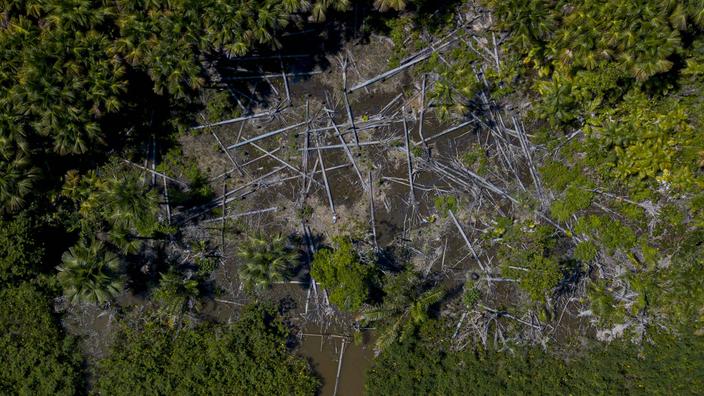December 29, 1970, November 4, 1980, October 11, 1990, September 23, 2000, August 7, 2010, and now, July 29, 2021 ... Each year, the “day of passing” advances a little more.
This Thursday, humanity has thus consumed all the planetary resources available for 2021 and is therefore preparing to live "on credit" until 2022. In any case, this is what the NGO Global Footprint Network wishes to demonstrate. , which annually endeavors to calculate the moment when the ecological footprint exceeds the planet's biocapacity.
Or more concretely, the day from which we caught more fish, fell more trees, built and cultivated more land than nature can provide us in a year.
The evolution of global overtaking since 1970. Global Footprint Network
To calculate the exact date, Global Footprint Network crosses two factors.
On the one hand, the ecological footprint of human activities, that is to say the land and sea surfaces necessary to produce the resources consumed and to absorb the waste of the population.
On the other hand, the biocapacity of the Earth, which corresponds to the capacity of ecosystems to regenerate and absorb waste produced by humans, in particular the sequestration of Co2).
Increase in carbon footprint and decrease in forest biocapacity
This index had fallen on August 22 in 2020 thanks to the health crisis. This Thursday, July 29, it returned to the level of 2019. "
These data clearly show that the recovery plans of the post-Covid 19 era can only be successful in the long term if they are based on regeneration and responsible management of ecological resources,
”said Laurel Hanscom, CEO of Global Footprint Network, in a statement. According to the NGO, the deterioration observed this year depends on two criteria: the increase in the global carbon footprint by 6.6% and the decrease in global forest biocapacity by 0.5%, notably caused by deforestation in Amazonia. "
In Brazil alone, 1.1 million hectares were lost in 2020, and estimates for 2021 indicate up to 43% increase in deforestation compared to last year
”, already observed in June Susan Aitken, leader of Glasgow City Council (which will host COP26 next November), on behalf of the Global Footprint Network and the Scottish Environmental Protection Agency.
Read also: The "vital signs" of the Earth are weakening, warn scientists
Result for the NGO: humanity is currently using 74% more than what the planet's ecosystems can generate, or the equivalent of 1.7 Earths. In 2021, however, the carbon footprint of transport remains lower than pre-pandemic levels. Citing the International Energy Agency (IEA), Global Footprint Network explains that CO2 emissions from road transport and domestic flights are expected to remain 5% lower than 2019 levels, while emissions from international flights are expected to be lower. by 33%. In contrast, global energy-related CO2 emissions are expected to rebound and increase by 4.8% compared to last year, as the economic recovery stimulates demand for fossil fuels, the organization said.
7.6% annual reduction in greenhouse gas emissions
And the latest reports from UN experts clearly identify the directions to follow: reduction of greenhouse gas emissions, exit from fossil fuels, drastic change in the agrifood production model.
Because in order to meet the objectives of the 2015 Paris Agreement and maintain the overall temperature rise "
clearly below 2 ° C compared to pre-industrial levels, and if possible at 1.5 ° C, gas emissions greenhouse effect are expected to decline by 7.6% annually,
”according to the UN.
Read also: Could global warming influence our sports practice?
However, according to a study published in early August by the journal
Nature Climate Change
, the unprecedented drop in greenhouse gas emissions during confinements due to Covid (which could reach 8% according to this study, more than 10% according to Global Footprint ) will do "
nothing
" to slow global warming, in the absence of systemic change in energy and food. Global Footprint Network insists on this point, in particular via the #movethedate campaign (to push back the date), ensuring that reducing CO2 emissions by 50% from the combustion of fossil fuels would make it possible to postpone the exceedance by more than 90 days, or halve the consumption of animal protein for 15 days.















